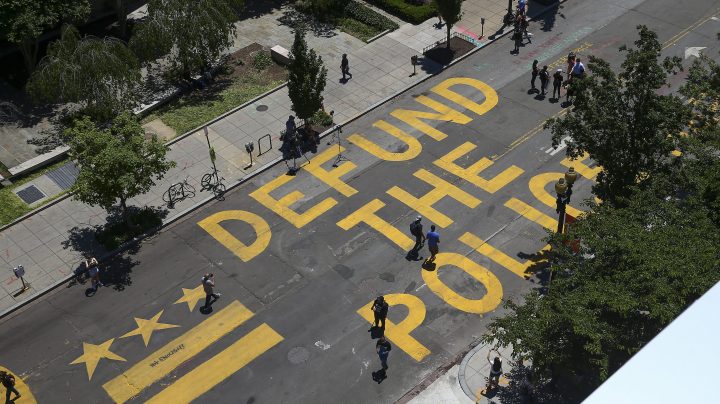
How one city provides public safety without a police department
How one city provides public safety without a police department

Protesters across the nation are calling on cities to “defund the police,” demanding more support for services like mental health and crisis intervention to reduce the involvement of police officers in nonviolent situations. In response, the Minneapolis City Council voted to dismantle the city’s Police Department, and Los Angeles Mayor Eric Garcetti announced that some police funds will be reallocated to community development efforts.
As more cities grapple with this movement, Sunnyvale, California, may provide some inspiration. The Sunnyvale Department of Public Safety has been part of the city since 1950. Most officers are trained in police, fire and emergency medical services, able to respond to various types of emergencies. Phan Ngo is chief of the Sunnyvale DPS. He spoke with Marketplace host Kai Ryssdal about what he’s learned from this model of policing. The following is an edited transcript of their conversation.
Kai Ryssdal: So you are the chief of public safety in the city of Sunnyvale. What’s the difference between that and a police chief?

(Courtesy of the Sunnyvale DPS)
Phan Ngo: Well, the difference is that with the Sunnyvale Department of Public Safety, we provide three services to our residents. Fire, police and emergency medical services. So I’ll give you a perfect example. When I first came here, from the San Jose Police Department, which is a traditional police department, I went to a call of a house fire. And obviously my fire personnel were out there, but in addition to that, there were patrol officers driving marked patrol vehicles that had changed into fire turnouts, and they were helping to put out the fire also.
So, after the fire was put out, one of my patrol officers came back to me and said, “Hey chief, I’m done here. I’m going to put back my police uniform and go back to answering police calls and service.” So that’s a great example of how we do business here in Sunnyvale.
Ryssdal: The crux of the matter right now, chief, in a lot of cities is accountability for specifically police officers and police actions. Do you believe that your paradigm favorably influences that? Does it make a difference in how you hold your officers accountable?
Ngo: You know, I’m a little bit biased because I am a firm believer in this program, but I certainly believe that it has something to do with it because of the fire discipline and the EMS discipline. Because firefighters are often seen by community members as caretakers, people who will help you out. So, I do think to a certain extent, it does have a positive impact in what we do here in our city.
Ryssdal: How closely are you watching the “defund the police” movement and the movement in Washington for some kind of national police reform?
Ngo: Well, I’ll start out by saying that what happened to George Floyd, it shouldn’t never have happened. I think all of us are condemning what happened. It was just a terrible tragedy for our country. And we have heard a lot from our community members and certainly Sunnyvale, even though we enjoy great support from community, we’re not immune. But in terms of you talking about defunding, meaning divesting resources to other services like mental health, I am open to listening to what people have to say. I’m open to the idea of sharing resources, changing some of the things that we’re currently doing in law enforcement. But when you talk about completely defunding or abolishing law enforcement, I don’t believe that is a practical idea. Although I would be more than happy to sit down and hear what people have to say to discuss what that would look like if police departments across the country are completely abolished.
Ryssdal: Last question, chief. This model that you have, with some degree of success in Sunnyvale, do you think it scales? Sunnyvale is not a huge city. Could it work in Los Angeles or New York?
Ngo: Look, I’m a big fan of this model, and I wish that this model could be implemented everywhere. However, I understand that [there] are unique circumstances, capacity, resources that you would have to consider if you want to have this model. And I will leave it to the cities to determine whether this is something that they would want to have in their respective city. If they want to ask me questions on how to make it happen, then I would be more than happy to assist. But I’m a firm advocate for this public safety model.
There’s a lot happening in the world. Through it all, Marketplace is here for you.
You rely on Marketplace to break down the world’s events and tell you how it affects you in a fact-based, approachable way. We rely on your financial support to keep making that possible.
Your donation today powers the independent journalism that you rely on. For just $5/month, you can help sustain Marketplace so we can keep reporting on the things that matter to you.


















